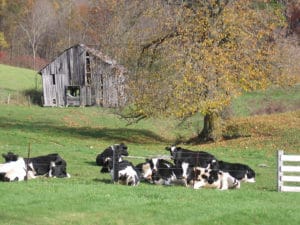LaCrosse Tribune
by M.L. Johnson
 That’s the position of a Colorado-based grocery store chain that recently announced it will carry only dairy products from farms where cows graze in pastures.
That’s the position of a Colorado-based grocery store chain that recently announced it will carry only dairy products from farms where cows graze in pastures.
Natural Grocers by Vitamin Cottage claims grazing improves the health of cows, consumers and the environment, and it hopes to expand an ongoing, national debate over how to best care for livestock.
The American Grassfed Association, which helped Natural Grocers develop its rules, said it is the first retail chain to carry only pastured dairy products; many already have rules barring suppliers from such things as keeping chickens and pregnant pigs in cramped cages.
But the issue isn’t as straightforward as it might seem as weather prevents most farms in the United States from grazing year-round. With no clear guidelines on what qualifies as “pasture-raised,” consumers paying a premium for grass-fed milk might be confused about what they are buying. And a dairy nutrition expert says he sees the store’s policy as mostly a marketing gimmick.
Natural Grocers was one of the first retailers in the 1990s to ban dairy products from farms that used growth hormones or excessive antibiotics, said Heather Isely, whose parents founded the business in 1955. Over time, the family decided that wasn’t enough because cows that were drug- and hormone-free still might not go outside.
“Consumers are buffeted with all these image of cows grazing on pasture when it comes to dairy,” Isely said. “When you talk to most people, that’s what comes to mind … and we wanted to become completely transparent and lift that veil away and say, you know, that’s not always the case and you really do need to take a more careful look at your dairy products.”
The company announced in late April that it would require all dairy products at its nearly 90 stores in western and Plains states to be made with milk from cows that grazed at least 120 days per year, mirroring federal organic standards. To be organic, cows also cannot consume hay or grain produced with genetically modified seed, pesticides or herbicides. A spokeswoman for the U.S. Food and Drug Administration says the agency does not set standards for pasture-raised or grass-fed products, but labels cannot be misleading.
Customers at a Natural Grocers store in Denver said they didn’t know how much time cows typically spend outside and the limited information on labels made it hard to tell how animals were treated. Josh Milligan, who picked up a gallon of Organic Valley milk for $6.15, said he thought cows should be allowed spend every day outside, but Natural Grocers’ policy was better than those of larger grocery chains.
Few farms in the United States can graze animals year-round because of the weather. Snow covers northern pastures in the winter and summer heat dries those in the South.
Dan Pearson converted his dairy farm in River Falls, Wisconsin, to a grass-fed operation by growing extra hay that he stores for winter. He believes it is a healthier system for cows and workers because both spend more time outside. Also, he said he has become a better steward of the land because he has had to learn to grow healthy, lush grass for his 100 cows.
“Healthy soils, healthy animals, healthy food and healthy people,” Pearson said.
But Tom Overton, a Cornell University professor who specializes in dairy cow nutrition, sees the grocery’s push for pasture-raised dairy as mostly a marketing strategy. Most farmers who graze supplement their cows’ diet with grain to ensure they get proper nutrition, Overton said. If they don’t, the cows can produce less milk, undercutting any environmental benefit.
“If it takes 15 to 20 cows to produce the same amount of milk as 10 in a different system, that makes a big difference in terms of how much manure is produced,” Overton said.
Overton says grazing doesn’t significantly change the nutritional value of milk, but a nutritionist at the Medical College of Wisconsin says there’s some science that suggests milk from pasture-fed cows has higher levels of linoleic acid, which has anti-inflammatory properties.
Andrea Moosreiner said she wouldn’t read too much into the studies, but thinks Natural Grocers’ policy makes sense.
“We are what we eat,” she said, “and that goes for our livestock too.”

